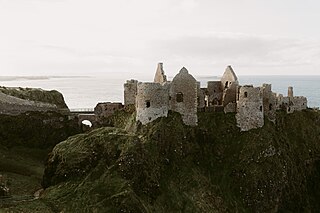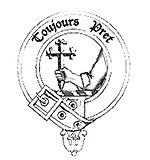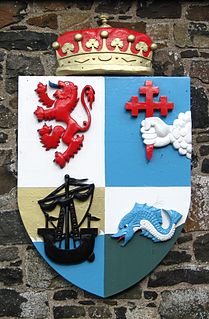Related Research Articles
Sorley Boy MacDonnell, also spelt as MacDonald, Scoto-Irish chief, was the son of Alexander MacDonnell, lord of Islay and Kintyre (Cantire), and Catherine, daughter of the Lord of Ardnamurchan, both in Scotland. MacDonnell is best known for establishing the MacDonnell clan in Antrim, Ireland, and resisting the campaign of Shane O'Neill and the English crown to expel the clan from Ireland. Sorley Boy's connection to other Irish Catholic lords was complicated, but also culturally and familiarly strong: for example, he married Mary O'Neill the daughter of Conn O'Neill. He is also known in English as Somerled and Somerled of the yellow hair.
Manus O'Donnell was an Irish lord and son of Sir Hugh Dubh O'Donnell. He was an important member of the O'Donnell dynasty based in County Donegal in Ulster.

Clan Donald, also known as Clan MacDonald, is a Highland Scottish clan and one of the largest Scottish clans. The Lord Lyon King of Arms, who is the Scottish official with responsibility for regulating heraldry in that country, issuing new grants of coats of arms, and serving as the judge of the Court of the Lord Lyon, recognizes under Scottish law the High Chief of Clan Donald. Historically the chiefs of the Clan Donald held the title of Lord of the Isles until 1493 and two of those chiefs also held the title of Earl of Ross until 1476.

Dunluce Castle is a now-ruined medieval castle in Northern Ireland, the seat of Clan McDonnell. It is located on the edge of a basalt outcropping in County Antrim, and is accessible via a bridge connecting it to the mainland. The castle is surrounded by extremely steep drops on either side, which may have been an important factor to the early Christians and Vikings who were drawn to this place where an early Irish fort once stood.
The Battle of Glentaisie, was an Irish battle fought in the north of Ulster on 2 May 1565. The result was a victory for Shane O'Neill over the Clan MacDonald of Dunnyveg. The conflict was a part of the political and military struggle, involving the English and occasionally the Scots, for control of northern Ireland. Although the MacDonalds were a Scottish family, based principally on the island of Islay in the Hebrides, they had long been associated with the Gaelic polity rather than the Kingdom of Scotland.

Clan MacDonald of Dunnyveg, also known as Clan Donald South, Clan Iain Mor, Clan MacDonald of Islay and Kintyre, MacDonalds of the Glens (Antrim) and sometimes referred to as MacDonnells, is a Scottish clan and a branch of Clan Donald. The founder of the MacDonalds of Dunnyveg is Eòin Mòr Tànaiste Mac Dhòmhnaill, a son of Iain Mic Dhòmhnaill and Margaret Stewart of Scotland, daughter of King Robert II. Members of the clan actually pronounced and spelled their name M'Connall due to the Gaelic pronunciation of the name Mac Domhnuill thus giving rise to the surname McConnell and its variants. While historically recognised as a clan by the Court of the Lord Lyon, it is now an armigerous clan as it no longer has a chief. The last chief was Sir James MacDonald, 9th of the Clan MacDonald of Dunnyveg or Clan Donald South, who died in London in 1626.

Clan MacAlister is a Scottish Clan and a branch of Clan Donald. The clan is the earliest branch to have split off from Clan Donald, claiming descent from Alasdair Mòr, son of Domhnall founder of Clan Donald. From Alasdair Mòr the clans takes its surname MacAlister; this surname is an Anglicisation of the Gaelic MacAlasdair meaning "son of Alasdair". In the 15th century the chief of the clan was seated in Kintyre, and the clan was centred there until the 18th century, when a chief sold the family estate in preference to an estate in the Scottish Lowlands.

The MacDonnells of Antrim, also known as the MacDonnells of the Glens, are a branch in Ireland of the primarily Scottish-based Clan Donald. Initially part of Clan MacDonald of Dunnyveg, the MacDonnells of Antrim became their own branch in 1558 when Somhairle Buidhe MacDonnell obtained the lordship of the territory in Ireland from James MacDonald, 6th chief of the Clan MacDonald of Dunnyveg. The MacDonnells of Antrim were a sept of the powerful Clan Donald of the royal Clann Somhairle,, that the English crown had attempted to cultivate since the early 14th century in its efforts to influence the course of politics in Scotland. The MacDonnells established a growing presence in Ireland throughout the 15th and 16th centuries,and played a crucial role in the politics of 17th century Ireland. The MacDonnell's achieved much success in Ireland largely to cultural and familial connections to the Gaelic nobility of Ireland. Today the surname is predominantly spelled McDonnell in Ireland and abroad, although many McConnell's are also of the same family, as that is the Gaelic pronunciation of the Mac Domhnaill. Most of the leadership of the Clan wrote their name as a variant of McConnell up until the 17th Century, including Sorley Boy MacDonnell himself. Many of the present-day McDonnell's have a common descent from Sorley Boy MacDonnell.
Coll Ciotach Mac Domhnaill (1570–1647) was a Scottish adventurer and mercenary of the Clan MacDonald of Dunnyveg branch of Clan Donald, who became Laird of Colonsay in 1623, by treachery. His name, which means "Coll the left-handed" or "the crafty", was anglicised as Colkitto. However he only used the nickname Ciotach late in his life in 1629 when it appeared in a Latin translation of a Gaelic letter where Coll refers to himself as "Ego Collatius Kiotach Macdonnell".
The Battle of Aura, was fought in the middle of the sixteenth century between the MacDonnells, led by Sorley Boy MacDonnell, against the McQuillans and O'Neills, in which the MacQuillans and O'Neills were defeated. Translated, Slieve-an-Aura means Hill of Battle – the modern spelling is Slieveanorra.
Events from the year 1590 in Ireland.
Finola MacDonald, styled after her marriage as Dame Finola Ó Domhnaill or Finola, Lady Ó Domhnaill, and better known by the Irish nickname Iníon Dubh, was queen consort of Tyrconnell. She was the daughter of Séamus Mac Dhòmhnaill, 6th Laird of Dunnyveg, and his wife, Lady Agnes MacDonald, and became the second wife of Sir Aodh mac Maghnusa Ó Domhnaill, king of Tyrconnell. She was the mother of eight children, including four sons. Her offspring included Hugh Roe O'Donnell, Rory, 1st Earl of Tyrconnell, and Cathbarr O'Donnell.
Gillaspick MacDonnell was a son of Colla MacDonnell, Captain of the Route and Evelyn MacQuillan. He was killed accidentally in 1571 at Ballycastle.
Dunaneeny Castle is a ruined castle on the outskirts of Ballycastle in County Antrim, Northern Ireland. The castle was home to the chiefs of Clan MacDonald of Dunnyveg and later the MacDonnells of Antrim. The castle is purported to be the birthplace of Scottish-Irish chief Sorley Boy MacDonnell.
Clan MacAlister of Antrim is an Irish clan and a branch of Clan MacAlister of Scotland. The clan was established as an Irish sept in Antrim in north-east Ulster, as gallóglaigh (galloglasses), in the service of the Lord of the Isles and Clan MacDonald of Dunnyveg.

The Route was a medieval territory in Gaelic Ireland, being located on the north-east coast of Ulster. The territory stretched along parts of the coastline of what is now County Londonderry and County Antrim, stretching between Coleraine and Port Brittas (Ballycastle), being bounded on the south by the Clogh River. Originally part of Twescard, a county of the Earldom of Ulster, it was later ruled by the MacQuillans and then the MacDonnells.
James MacDonald, alias McDonnell, 6th Laird of Dunnyveg, Scottish-Gaelic lord, died 1565.

The history of the Bissett family in Ireland can be studied independently from that of the originally identical family in Scotland, because of their unique experience following their arrival in Ulster in the early or mid-13th century. Here, while still remaining involved in Scottish affairs, the Bissetts would establish themselves as the Lords of the Glens of Antrim and quickly become equally, then eventually more involved in the politics of the Irish province, becoming among the most Gaelicised of all the so-called Anglo-Norman families in Ireland. The heads of the leading branch of the family soon adopted the Gaelic lineage style Mac Eoin Bissett, by which they are known in the Irish annals, and which translates as "Son/Descendant of John Byset", after a prominent ancestor born in Scotland. In a number of English and Anglo-Norman sources the same head of the family is referred to as the Baron Bissett, also with variants.
The Battle of Knockavoe (Cnoc-Buidhbh) was fought in 1522 between the O'Donnells, led by Hugh Dubh O'Donnell and Manus O'Donnell, both sons of Sir Hugh Dubh O'Donnell, against the O'Neills, in which the O'Neills and their supporters were surprised and routed. Knockavoe was not a lost pitched battle, rather it was in fact the result of a nighttime surprise attack on the O'Neill camp by the O'Donnells. Knockavoe is the hill just behind Strabane in County Tyrone.
Mac Eoin, MacEoin or McEoin is an Irish surname. Notable people with the surname include:
References
- ↑ Annals of the Four Masters Vol 5 (AD 1501-1588). 2009.
- ↑ "Kenbane Castle". 2009. Archived from the original on 30 December 2008. Retrieved 7 July 2009.
- ↑ "MacAlister of Loup". 2009. Archived from the original on 26 November 2010. Retrieved 7 July 2009.